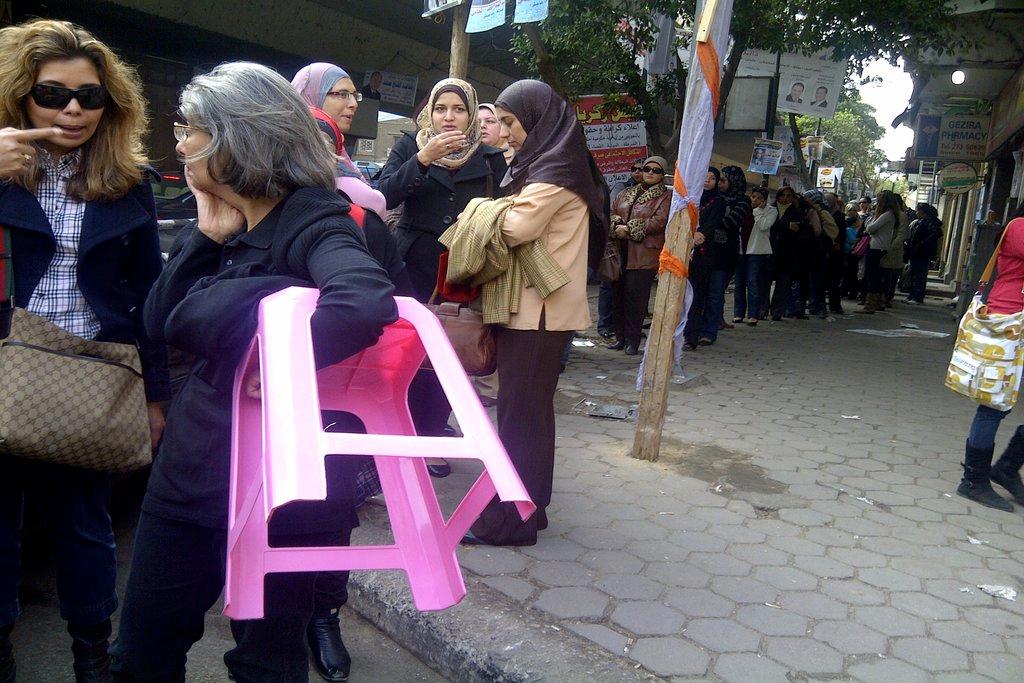Egypt’s election fever
Women wait to vote in the Zemalek neighborhood of Cairo on November 28, 2011.
CAIRO — Despite last week’s violence between Central Security Forces and protesters condemning the ruling military in the capital’s iconic Tahrir Square, people hurried to polling stations Monday to cast their vote and do their part in the country’s belated transition to democracy.
Women at two polling stations in downtown Cairo and the upscale Zamalek endured hours in queues amid political chatter, thrilled by the prospect of voting for an accountable parliament. Their feet, however, were not thrilled at all — many joked they wanted the old regime back with its conveniently fraudulent elections not requiring them to queue up for so long.
Turnout was huge compared to previous years, when many shied away from elections: Many feared violence by Mubarak’s National Democratic Party’s (NDP) thugs while others were apathetic after repeated fraud.
Also, the options were limited then. Opposition parties were stifled and marginalized from the political sphere. The Muslim Brotherhood, now enjoying popularity among the predominantly Muslim population, was denied the right to form a political party.
But on November 28, the debut post-Mubarak parliamentary elections kicked off, with hundreds of liberal, Islamist, and ex-NDP candidates looking to claim a place in the country’s reforming system.
At a women’s polling station in downtown Cairo just 10 minutes away from Tahrir, voters lined up, buzzing with excitement as if about to take a crucial exam. They compared notes over candidates and party lists.
One outspoken women put her faith in the upcoming parliament, believing it will be truly accountable. She said they new parliament would not dare let the public down.
“Now our eyes are wide open, and our voices loud,” she said.
And at the Ramsis station in downtown Cairo, the crowd was big and eclectic. A heated debate over the place of religion in politics between two dissimilar voters (a fair-haired liberal and an Islamist dressed in a burqa) had the crowd nervously looking on for a while. But after a few hours in line, the two women agreed to disagree and ended up splitting crackers and fool sandwiches.
Despite the Muslim Brotherhood’s adamant campaigning, from distributing vegetables in villages to handing out flyers at the door, some women said they came to vote for “anyone but Ikhwan [Arabic for ‘Brothers’].”
At the ballot, hundreds of elderly ladies escorted by their daughters looked weary but keen to vote. Some mothers brought their babies along. A four-year-old girl dressed in bright pink trousers and a yellow t-shirt clung to her mother’s legs with one hand, the other hand clumsily holding a plastic bag full of treats and a colorful assortment of candidate flyers.
In the upscale residential area of Zamalek, the clientele differed greatly from that in Ramsis. Girls were stylishly dressed, iPods everywhere. A waiter from a local coffee shop even walked down the line, delivering sandwiches and lattes to voters. It looked like a line for American Idol auditions.
Taking advantage of vulnerable voters, some parties pulled off same-day campaigning, defying election laws by distributing flyers to the thousands pouring into polling station.
Many of the waiting made comments like, “People are trying to confuse us, to wear us out. Well, we’re not going home.” and “We owe it to our country to vote.”
The women in the queue went from sharing recipes to sharing political views. There was no dearth of gasps and complaints about the length of the line, nor of stories about kids waiting at home. But they stood their ground.
One woman raised her arms in the air as shed stepped out of voting room, screaming, “Done! Done! I’m done!”
But not everyone was quite as high-spirited. The wait overtook a few women who went outright ballistic. One launched into a swearing spree, another huffed and puffed while shouting with fury, “If [Egypt] won’t change anyway, what does it matter?” as she dragged her daughter away behind her.
A number of Egyptians have decided to boycott the elections, deeming them illegitimate because SCAF remains in control of the country. They believe the regime that has lost its “revolutionary legitimacy.” In other words, SCAF has lost Tahrir’s approval.
Those in line deemed the idea of boycotting elections ridiculous.
“We have come here to prove that we have a voice, and no one can pull us back,” a middle-aged woman said.
Another joked, “It’s more crowded than Tahrir here!” And it was indeed.
Ironically, those in Tahrir boycotting elections are the reason many of those voting are so hopeful, trotting to polling stations in unprecedented numbers. Once again, Cairo proves itself a city of irony and contrast.
